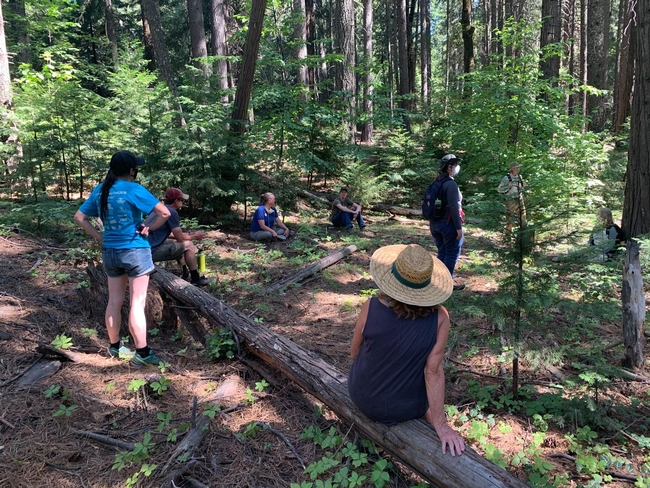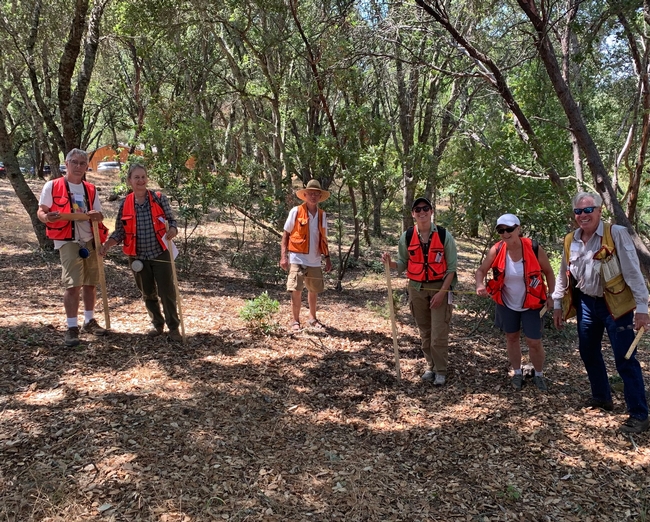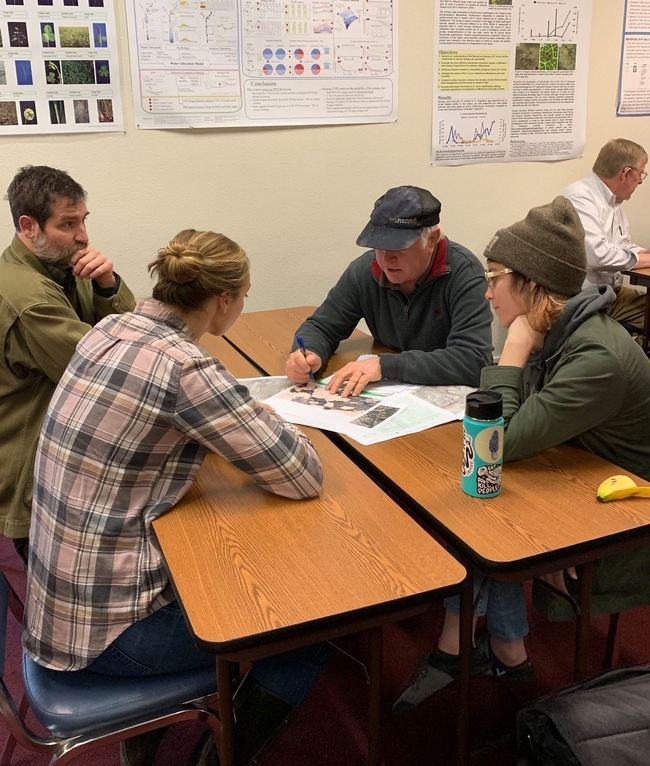Posts Tagged: Education
UC Riverside Happenings
UC Riverside awarded $1.5 million for sustainable agriculture initiatives
RIVERSIDE, Calif. -- The University of California, Riverside, has been awarded $1.5 million in grants from the California Department of Food and Agriculture to lead three interconnected projects aimed at transforming California's specialty crop farming. The initiatives focus on youth engagement, sustainable waste management, and advanced agricultural technologies.
“These multidisciplinary projects are designed to address complex food system challenges by integrating diverse perspectives,” said Deborah Pagliaccia, a professional researcher in the UCR Department of Microbiology and Plant Pathology and co-principal investigator of the grants. “They aim to foster a learning environment where students and stakeholders contribute to a cohesive curriculum that bridges the gap between theoretical knowledge and practical application.”
Each of the three projects has received about $498,000 in funding and will integrate education, research, and practical application to help shape a sustainable future for global food systems.
“We are also committed to equipping and informing students with the knowledge and skills necessary for careers in agriculture,” said Georgios Vidalakis, a professor of plant pathology and director of the UCR Citrus Cloning Protection Program, who is the grants' principal investigator. “We will use a holistic teaching approach to enhance academic and professional development and prepare students to continue their education or enter the job market as effective change agents.”
The first project is titled “Seeding Success: Youth Engagement and Skill Development for Sustainable and Resilient Specialty Crop Farming in California.” Led by UCR in collaboration with UC Agriculture and Natural Resources, the Growing Hope Project, John W. North High School, and San Andreas High School, the project aims to cultivate a skilled, diverse, and adaptive workforce prepared to meet emerging climate and socio-economic challenges in California's specialty crop sector.
A key component is the development of a new course, “Sustainable Agri-Food Systems and Circular Economy,” which is designed to educate, engage, and empower high school and UCR undergraduate students to address global food security and environmental sustainability challenges. Students will participate in workshops, labs, field visits, and internships that offer them practical experience in sustainable farming technologies such as controlled environments, insect-based farming, climate-smart agriculture, and nature-based farming.
The second project is titled “Closing the Loop: Transforming Agri-Food Waste into Sustainable Carbon-Based Soil Amendments and Fertilizers.” Researchers will address climate change, improve soil health, promote sustainability, and enhance carbon sequestration practices. Specifically, they will divert waste from landfills, reduce greenhouse gas emissions, and lower reliance on synthetic fertilizers. They will also transform agri-food waste into valuable soil amendments, research the impacts of organic waste-based soil amendments on field-grown trees and greenhouse-grown vegetables, engage underserved farmers, and create internships for UCR students.
The third project is titled “Sustainable Citrus: Unlocking the Potential of Controlled Environment Agriculture for Commercial Nursery Growers.” With the goal of translating scientific discoveries into practical solutions for commercial growers, the project will enhance controlled environment agriculture technologies for citrus nursery growers. Researchers will focus on optimizing light conditions to improve plant growth and stress resilience while also enhancing the quality of disease-free plants and improving energy and cost efficiencies. Researchers will train underserved farmers and offer internships to UCR students to give them hands-on experience in advanced agri-food systems technologies.
All three projects, which begin November 1, 2024, and end June 30, 2027, will be interconnected through their use of labtofarm.org, a platform dedicated to bridging the gap between laboratory research and practical farming applications. The platform will allow researchers to disseminate their findings, engage with a broader community, and develop sustainable methodologies that are economically viable and environmentally friendly.
“LabtoFarm.org will allow us to engage undergraduate students, underserved farmers, and various stakeholders in a meaningful exchange of knowledge and innovation,” Pagliaccia said. "The platform also serves as a hub for student internships and collaborative projects, offering valuable opportunities for professional growth, hands-on experience, and direct involvement in sustainable agri-food systems practices."
According to Vidalakis, UCR is well positioned to conduct the three projects because of its location.
“We are one of very few universities conducting agricultural research that are located in urban environments,” he said. “Ours gives us access to more young minds that we can train to become business owners, entrepreneurs, and government officials. Traditionally, large urban centers have been generators of research, development, and new technologies and ideas.”
Pagliaccia, who has extensive expertise in sustainable agri-food systems, said the idea for the three projects was conceived during her service as managing director of UCR's California Agriculture and Food Enterprise, or CAFÉ.
“In CAFÉ, we worked to empower the community to make well-considered decisions toward a sustainable and economically successful future for global agri-food systems, which is also the overall goal of our three projects,” she said.
Pagliaccia and Vidalakis will be joined in the projects by co-principal investigators Samantha Ying, Robert Jinkerson, Sohrab Bodaghi, and Arunabha Mitra at UCR; and Jonathan Kaplan at Sacramento State University.
Iqbal Pittalwala
University of California - Riverside
iqbal@ucr.edu
Office: 951-827-6050

citrus and mountains
Ag from Above x Ag for All (AFA2)
IGIS is proud to announce its collaboration with 4H on a new and exciting, three-year, USDA-funded grant, Ag from Above x Ag for All (AFA2), aimed at sparking interest in food and agriculture among teenagers by using cutting-edge drone and mapping technologies. By blending hands-on activities with real-world applications, AFA2 empowers young people to explore the science behind agriculture in fun and meaningful ways. AFA2 is not just about teaching technology—it's about using that technology to make a real difference in communities and ensuring that the next generation of agricultural scientists and leaders is diverse, skilled, and ready to take on the challenges of the future.
Period: 3-years from August 1, 2024 to July 31, 2027.
Tasks: Develop, test, and evaluate two curricula, SkyMappers: Agricultural Drones and GIS Mastery, Dronovation: Cultivating Change with Teens, and prepare an educator professional development guide.
Who It's For: This project targets teenagers aged 13 to 18, with special attention to including girls and Latino youth—groups often underrepresented in STEM fields.
Why It Matters: The future of farming and food production will increasingly rely on technology. By engaging young people with drones and GIS, AFA2 aims to build their scientific literacy and interest in agriculture, while also preparing them for future careers in these vital fields. Additionally, by focusing on food justice and culturally relevant learning, we aim to empower all young people to see themselves as future leaders in science and agriculture.
Our Partners: University of California's Cooperative Extension, 4-H Youth Development Program, Informatics and GIS Program, the UC Santa Cruz CITRIS Initiative for Drone Education and Research, and the UC Davis AI Institute for Next Generation Food Systems.
- PI: Steven Worker, 4-H Youth Development Advisor (Sonoma)
- Co-PI: Nathaniel Caeton, 4-H Youth Development Advisor (Shasta)
- Co-PI: Matthew Rodriguez, 4-H Youth Development Advisor (Placer)
- Co-PI: Andy Lyons, IGIS Program Coordinator (UC Berkeley)
- Co-PI: Sean Hogan, IGIS Academic Coordinator (Davis)
- Collaborator: Flavie Audoin, Rangeland Management Extension Specialist (Univ. of Arizona)
- Collaborator: Lucy Diekmann, Urban Agriculture/Food System Advisor (Santa Clara)
- Collaborator: Becca Fenwick, Director, CITRIS Initiative for Drone Education and Research (UCSC)
Lawn-pocalypse! Surviving Drought
Ah, summer! The season of sunburns, pool parties, and… lawn droughts. If your once lush, green carpet now looks like a crunchy brown doormat, you're not alone. Let's dive into why your yard is staging a dramatic death scene and what you can do to...

Bermuda grass and weeds overtaking drought stressed turf grass.
UC SAREP funds 8 sustainable food and farming projects
Projects will support socially disadvantaged farmers, increase urban access to healthy food and more
The UC Sustainable Agriculture Research & Education Program (SAREP) is pleased to announce the recipients of the Sustainable Agriculture and Food Systems 2024-25 Small Grants Program. This grant program will fund planning, research and education projects that support the development of sustainable community food systems and environmentally sound and economically viable farming enterprises.
Of the 33 eligible applications, eight applicants were selected to receive approximately $80,000 in combined funding to support their work. Individual grants are limited to $10,000. “The Small Grants Program is an important part of our mission,” said Ruth Dahlquist-Willard, interim director of UC SAREP. “By facilitating these grants, SAREP is able to support ANR in engaging a wide range of food systems stakeholders, outcomes show that a small financial investment can have a large impact in improving the lives of Californians.”
The eight recipients of this year's grants are:
Planning
Building Capacity and Resiliency Among Networks of Socially Disadvantaged California Farmers
Fresh Approach will establish a network of pooled learning and technical support that will aid emerging food-aggregation businesses in accessing sustainable market channels, including emergency food distribution. As part of the project, they will enhance an interactive GIS mapping tool of value chains to streamline market opportunities for socially disadvantaged farmers and aggregators. (Project lead: Andy Ollove, Fresh Approach)
Sustainable Urban Resident Food Gardens Expansion Planning Project
Growing Hope Gardens will systematize the process of outreach, discovery, design, planning and implementation in creating new urban resident food gardens. The project will document Growing Hope Gardens' garden development process into a training and implementation manual to more effectively duplicate food garden programs in more low-income urban communities. (Project lead: Carolyn Day, Growing Hope Gardens)
Research
Evaluating Best Management Practices for Cover Crops to Minimize Nitrogen Losses in California's Salinas Valley
This project will quantify the effectiveness of cover cropping at different planting times and termination dates to scavenge excess nitrogen in the soil and reduce nitrate leaching in a Salinas vegetable cropping system. The results will inform Ag Order 4.0 for cover crop credits and help stakeholders in the Salinas Valley better understand crop management for efficient nutrient cycling. (Project lead: Scott Fendorf, Stanford University)
Implications of American Kestrel Diet, Dispersal and Migration on Pest Control in Northern California Farming Systems
Investigators will study how the diet, post-breeding dispersal, and migration of nesting kestrels influences biological pest control on Northern California farms. The project will generate management recommendations for using the predatory bird for biological pest control in sustainable agriculture programs across California. (Project lead: Breanna Martinico, UC Cooperative Extension)
Education and Outreach
EAT! Community Farms Market Access and Promotion Project
This project helps socially disadvantaged and indigenous farmers in Riverside County create pathways for realizing economic return. EAT! will provide mentoring for marketing strategy development, connect farmers to buyers, promote the farmers market so it's more profitable for farmers, and provide a cooperative farm stand in the city of Norco for farmers to sell produce directly to consumers. (Project lead: Patrick Mitchell, Ecological Agricultural Training Cultural Center [EAT!])
Cultivating Cooperative Education, Stewardship and Connection at the Agroecology Commons Cooperative Incubator Farm
Agroecology Commons aims to address challenges faced by young, first-generation, BIPOC, queer and femme farmers at the Agroecology Commons Cooperative Incubator Farm in the Bay Area. The project will focus on education and outreach, providing technical assistance and training in regenerative agriculture practices such as soil health, pest management and crop diversification to socially disadvantaged farmers. (Project lead: Jeneba Kilgore, Agroecology Commons)
Signage and Mural Refurbishment for Southeast Asian Farmers to Improve Direct-to-Consumer Marketing
This project will build new, long-lasting farm signs for Southeast Asian farmers growing diversified vegetables and berries in the Sacramento region. Improving the appeal and durability of farm signs will increase the profitability of the farm stands as these resource-limited farmers rely on direct-to-consumer marketing strategies to promote their businesses. (Project lead: Margaret Lloyd, UC Cooperative Extension)
Community Nutrition Security and Education Program
Farm Discovery at Live Earth will increase access to organic produce for individuals and families experiencing food and nutrition insecurity in the Santa Cruz and Monterey Bay area. This will be accomplished through farming, outdoor education and nutrition education programs focusing on regenerative agricultural practices to connect youth and families to their regional agricultural and ecological systems. (Project Lead: Jessica Ridgeway, Farm Discovery at Live Earth)
The UC SAREP Small Grants Program has a big impact! Help us fund more projects that support sustainable community food systems and environmentally sound, economically viable farming enterprises. To support this program, please donate here. Choose SAREP Small Grants Program for the designation.
Connecting California’s forest landowners with California Tree School
While trees and forests are often emblematic of constancy in a fast-paced world, our state's forests are actually changing before our eyes. Since 2020, the UC ANR Forest Stewardship Education (FSE) program has been helping California's forest landowners be proactive about the inevitable shifts their forestland will experience. The Forest Stewardship and Post-Fire Forest Resilience workshop programs use an online educational format, which guide landowners through the basics of creating forest management plans and managing post-fire landscapes, respectively. Now, the FSE team is piloting a new program to engage a wider audience of forest landowners and community members passionate about trees.
This spring, the Forest Stewardship and UC ANR Fire Network teams are holding the first California Tree School, where individuals attend multiple in-person classes on the forestry topics they are most curious about. “The existing online programs are very focused on forest management plans and post-fire activity, and [Tree School] lets us tackle other topics,” said UC ANR forest and natural resources advisor Susie Kocher.
A one-stop shop for continuing forestry education
California Tree School was inspired when Forest Stewardship Academic Coordinator Kim Ingram, Post-fire Academic Coordinator Katie Reidy and Kocher attended Oregon State University Extension's Tree School event in Clackamas County, Oregon. OSU Tree School is a day-long experience comprised of classes that cover the different dimensions of forestry: constructing a house from your own timber, carbon cap and trade, and buying portable sawmills are just a small sampling of the options for attendees. OSU Tree School students ranged from forest landowners to community college students, contributing to a space which would facilitate community connections as well as learning.
Kocher described the experience as a “a great one-day, one-stop shop to keep up-to-date on what we [forest landowners and professionals] should know.” Excited by the breadth of opportunities offered at OSU's Tree School, Ingram, Kocher and Reidy were inspired to bring the format to California.
“It's our time to discuss the whole ecosystem,” noted Reidy. “Tree School is bringing in the trustworthy, reliable group of experts who can provide more information on the questions pertaining to landowners' specific goals.”
California Tree School will be offered in two locations this spring, with CA Tree School- Hopland taking place on May 4, and CA Tree School- El Dorado on June 1. Similar to OSU's Tree School, attendees are expected to be a mix of forest landowners, natural resource professionals and interested community members.
Connecting statewide professionals; personalizing forestry education
Tree School offers attendees the opportunity to focus on subjects that pertain to their specific learning needs. This personalized approach is a new foray for the Forest Stewardship team, but is something that Ingram says workshop participants have been wanting for some time.
“Our participants never think they learn enough. They are always asking for more information, and this Tree School gives us the chance to expand on things we might not have had a chance to go over in the workshop series,” remarked Ingram. Additionally, Tree School instructors had creative freedom when it came to developing their classes, from the topic to the class format. This is evident when browsing through each session's class catalog. CA Tree School attendees choose four classes to attend, meaning they can build their first burn pile, understand the ins and outs of regional wildlife, paint outdoors and learn how to aid statewide reforestation efforts all in one day.
“I felt that Tree School created a sense of trust around complex topics,” noted Reidy about her experience last year in Oregon. For CA Tree School, the Forest Stewardship team aims to do the same. This meant recruiting from throughout the UC ANR network and other organizations, including CALFIRE and CARCD (California Association of Resource Conservation Districts), to bring trusted voices to the community.
“What's exciting about Tree School is that we are bringing natural resource professionals from all around to engage everyone at the same time, and all in one place,” noted Ingram.
The team is excited to see all the connections that will be made between community members and professionals during this pilot year, and “if this is successful and we can bring it back next year,” commented Kocher, “we are definitely interested in partnering with more people and expanding our outreach.”
Making CA Tree School an in-person experience was important to the team, as much of the education is hands-on. Additionally, Kocher sees enhanced potential for building personal connections: “In person, you have this opportunity for people to identify as part of a community,” noted Kocher, “So I'm excited for people to hang out with each other.”
Encouraging an informed community
“You can't separate the emotional from the physical, and there are a lot of topics in forestry like wildfire and economics that can be a bit of a downer,” said Ingram. “I'm excited to help create a positive learning environment, and one that encourages folks to turn to UC Cooperative Extension for these resources.”
“Our main goal here is to get science out there,” concurred Reidy. “The more exposure people have to science, the more confident they feel in themselves and their wants and needs.”






